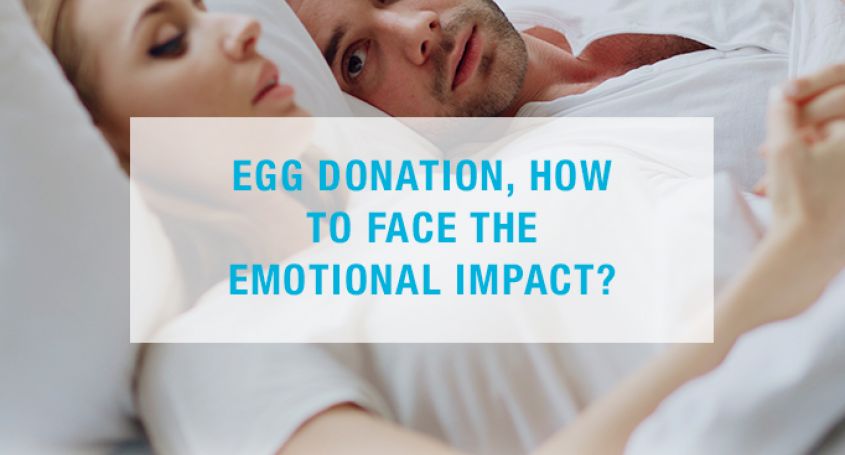Egg donation is an assisted fertility treatment used in those cases where pregnancy cannot be achieved with one’s eggs. It is currently one of the most popular fertility treatments. Nonetheless the emotional, psychological and even ethical implications might take a toll on some patients.
Which are the concerns generated by an IVF with egg donation?
In the majority of cases, those couples who consider egg donation have had to deal with previous failures in treatments where their own eggs were used. This causes psychological exhaustion which paired with the treatment particularities can lead to a pseudo-depressive state. When egg donation is seen as a last resort to achieve a pregnancy, anxiety, fear of a new failure and many new questions come up. This emotional imbalance can push the couple to feel guilty for having had considered parenthood altogether.
Added to the fear of failure, the genetic factor is one of the aspects which makes many patients uneasy. Often, questioning if the new parents are going to be able to take care and love their child as if their own takes up a lot of headspace. On top of that, there are common questions like:
Who is the baby going to look like?
Oftentimes not personally knowing the donor raises insecurities related to the child being unable to relate to their parents based on physical differences. Therefore, donors undergo thorough analysis so their phenotypical characteristic will match the parents’ ones, following the framework set by the Spanish Fertility Society (Sociedad Española de Fertilidad).
Which guarantees do donors offer?
Many couples wonder if their new baby will be born with a serious illness. Needless to say all donors need to meet a list of requirements to guarantee they are free of any illness as well as having a standard IQ level and a prime psychophysical health.
Kids personality is gained by imitation, mostly of their parents. They learn through their sociocultural environment as well as with their parents’ values and schooling. Our brains have neuroplasticity which is the ability to modify its structure and shape depending on our life’s experiences.
Epigenetics shows us that our own life experiences and environment shape our genetic composition. From the moment a fertilized egg is transferred, communication is established.
Should family know about it?
Egg donation is still a taboo for many people and therefore there is often a certain secretiveness out of fear of facing incomprehension and disapproval from others.
The debate between to or not to share it with family members can be stressful and lead to a feeling of betraying one’s family and close friends.
How to communicate this choice is very personal, one should choose how to deal with it during the process.
Should we tell our kid in the future?
One of the biggest fears is the possible rejection from ones’ kid. Generally, it is advisable to have an honest relationship with your kid, with few secrets. When explained at a right age and naturally kids are capable of understanding it without many problems. Otherwise if one chooses to keep the secret there is a risk of the kid finding out from third parties turning it into a misunderstanding one should want to avoid.
How to face all of the questions, worries and concerns?
Most importantly is to understand your child will be shaped by the habits, tradition and values of the surrounding environment. Understanding this is key to seeing an egg donation treatment with less skepticism.
Additionally, psychological support is of great help. In Barcelona IVF we have a team trained in psychological sensibility who will lead you from the start and will answer any question you may have. Getting all of your questions answered by the medical team, regarding the process or the donor is key to feel informed and at ease with one’s decision.
Seeking other parent’s experiences and reading about this process can be enlightening and give a huge feeling of reassurance.
At the end of the day being a parent is a process, not a biological act. What defines a family is love, the connections that are created and the shared memories. Leave your fears aside and make your dream come true.














